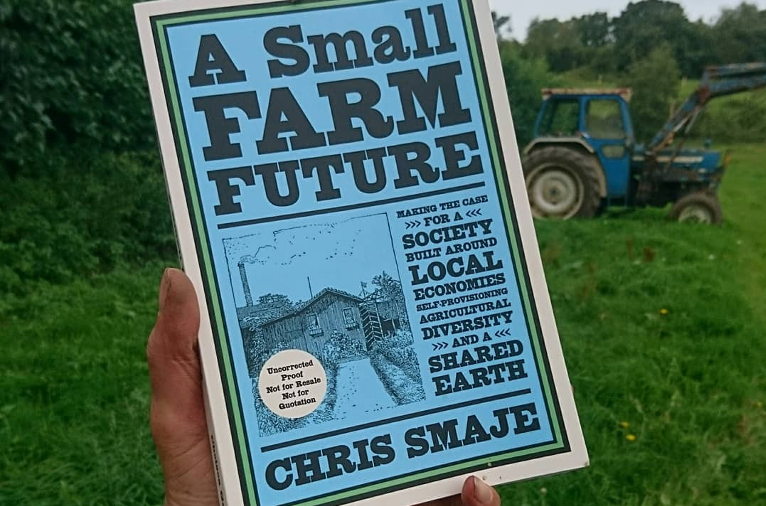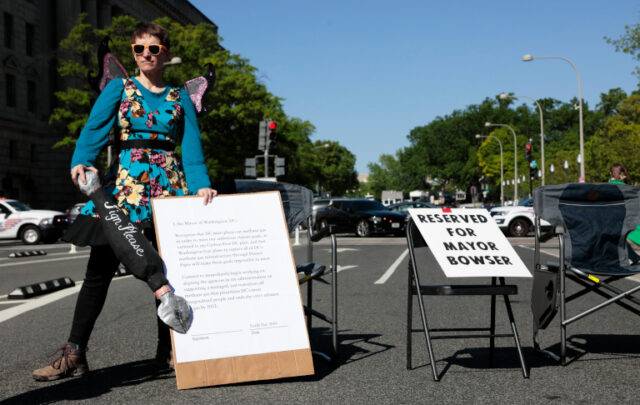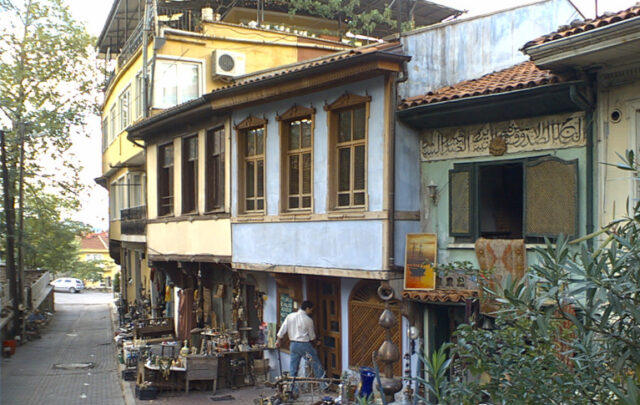A little more in this post about the climate protesting I mentioned last time that recently landed me in the dock, since a couple of folks said they were interested to hear about it. Then back next time to my ongoing blog cycle about A Small Farm Future. Mostly, I want to focus this post on some wider aspects of the protesting that in fact link to the book, but a brief account of the events from a personal perspective will help set the scene, and may be of interest.
Last year, I went to the opening rally of Extinction Rebellion’s August ‘rebellion’ in Trafalgar Square, then joined the march that processed towards Covent Garden. Some wily activists had somehow managed to erect a gigantic, two-storey pink table on the junction at Long Acre, with people locked onto its legs and others perched atop to prevent the police from easily removing it. The site quickly turned into quite a protest party, while the police – almost as quickly – encircled the whole junction, including some of its surrounding shops and cafés. They let people exit the cordon but not enter it, at least so it seemed to me (more about this detail later).

I stayed inside the cordon during the afternoon, dropping into a couple of the cafés for food and drink. At around 7pm the police announced they were making the protest illegal under Section 14 of the Public Order Act, meaning that we needed to disperse. I decided not to do that, and instead sat in front of a protestor who was locked on to a table leg, reasoning that it would take the police longer to remove the lock-ons and dismantle the table if they first had to remove the likes of me.
A police officer engaged with me, warning me of various consequences should I be arrested such as estrangement from my family, a travel ban to the USA, and trouble with my employers. These weren’t terribly disquieting threats, since several members of my family are far more active climate protestors than me, I don’t really need to go to the USA, and while my boss can be an absolute arse sometimes, he is, since I’m self-employed, highly unlikely to fire me.
Anyway, long story short, I was arrested around 8pm and carried off by four officers, losing the odd item of clothing and sustaining a few cuts and bruises in the process, as well as having my feet used as an involuntary battering ram against a bystander, all of which I think stemmed more from police incompetence than ill-will.
Half an hour handcuffed in a van, then booked in at Walworth police station. Mugshots, fingerprints, DNA sample, and seven hours in a cell. Fitful sleep mixed with staring at the Samaritans and drug/alcohol advice messages on the ceiling, thinking about all the misery that must have been contained within those walls. Then release in the small hours of the morning, a chat with the lovely XR support people waiting outside the police station, and stumbling home.
As I’ve written here before, when XR started I was sceptical about it for various reasons that I now consider mistaken, one of which was probably my own implicit fears of confronting authority, mixed with a preciousness about the need for my actions to be entirely within my control in some perfectly theorized and intellectualized moment of political history-making.
Not how it works.
I wrote in A Small Farm Future about the need for communities to carve out spaces of autonomy from the power of centralized states so they can develop viable and renewable forms of local livelihood-making. Well, what we achieved at Long Acre was very far from that, but if someone like me for whom the consequences of arrest are so low can’t even minimally follow through on his own ideas and help to hold the micro-space of a single road junction for a few hours while raising the profile of the climate emergency in the process, then I feel my politics imploding with implausibility. Or else bloating with that political preciousness I mentioned – waiting, always waiting, for the correct political moment that I’ve theorized before deigning to act.
The efficacy of my little escapade in Covent Garden is debatable of course, as is everything that I or anyone else can do to mitigate the challenges of our times – writing books or blogs, growing food, shopping thoughtfully, composting waste, working with relevant organisations, political activism. I think my arrest was reasonably worthwhile in the circumstances, and meaningful at least to me – not least because it was shortly before the key international COP26 meeting in Glasgow, and it seemed to me then (and still now) that if there was a right time to raise a public rumpus about the need for urgent and radical climate action, it was at that particular moment.
Eight months on, as I related in my last post, I was convicted for the Section 14 breach. I represented myself in court, on the grounds that the only way I’d be found not guilty would be if my lawyer identified some obscure legal technicality to exploit, which wasn’t really the point – and I’d still end up paying my lawyer more than the actual fine.
The prosecution called as a witness the police superintendent who’d imposed the Section 14. I thought his case for doing so was weak. Criminal damage (some XR stickers on an ATM). His discussions with some taxi drivers who said they’d like to run us protestors over (taxi drivers, eh?). Graffiti on the pavement (it’s London). A nightclub that was closed on the day of the protest but might have lost business the next day if the protest had continued (it didn’t). Café owners short of business.
On that last point, when I got the chance to cross-examine him I put it to him that if the police choose to seal off an area and stop people entering it, then it’s likely that any cafés inside said area will lose business as a result of that decision. He replied along the lines that the police hadn’t sealed off the area, and were letting genuine customers through their cordon if they could prove they’d booked ahead. Like you do when you’re a tourist in the middle of London and fancy a slice of pizza.
Nah, that area was sealed off.
When it was my turn in the dock, I tried two lines of defence. First, the right to protest. Something I hadn’t realized until recently is that although a public highway is for the use of the public, the law is vague on exactly what that use should be. Protesting on it isn’t necessarily a less legitimate use than driving along it (as one of the refrains at XR protests goes: “Whose streets? Our streets!”). In my opinion, it’s reasonable for the police to have the power to disperse protests to mitigate serious public danger or disruption. But stickers on an ATM, or cafés losing custom when they’re ringed by police officers, don’t strike me as serious public danger or disruption, given the circumstances.
This raises a point of wider political importance. For all the angry voices calling for greater police powers to shut down climate protest, in truth the police haven’t always used – or perhaps have been instructed not to use – the existing powers available to them, I suspect because jails full of scientists, elderly priests, retired community workers and suchlike aren’t a good look, and aren’t that great for public finances either. But once the authorities do have summary powers to limit collective protest, then political liberty is on the line. The lock ‘em up brigade might pause to ponder how much the powers that be care about their own cherished ideals. Those calling for increased state power against the public might end up regretting what they wished for.
Anyway, in court I made a brief case setting my right to protest as enshrined in the Human Rights Act against the superintendent’s overzealous Section 14. Then I moved on to my second, and I think more important, defence of necessity.
If you smash a door down in the normal course of things, you’re liable to be charged with criminal damage. But if a building is on fire and you smash the door down to rescue someone trapped inside, our legal and political systems and our common sense align pretty well in accepting that this is not a crime.
When it comes to climate change the building is definitely on fire, but our legal and political systems are barely capable of locating the door, let alone smashing it (last year saw the highest GHG emissions ever). Often, they prefer to criminalize ordinary folks who try to show them where the door is. What we have here is a collective action problem, in which people find themselves unable to create the cooperative structures they need to assure their own joint self-interest (in other words, we have a tragedy of the commons – a concept that, though badly misnamed, goes quite some way to explaining the climate crisis, even as many thinkers queue up to dismiss it).
One of the problems is that it’s not easy to tie cause (climate change) directly to effect (e.g. human suffering) and to effective actions to alleviate it (e.g. climate protesting). But recent scholarship is increasingly able to relate individual human deaths and suffering from extreme weather events pretty much directly to climate change. And the IPCC’s recent report – signed off by most of the world’s governments – acknowledges for the first time that civic engagement, including protest and civil disobedience, is the foundation for collective action of the kind that’s needed for transformative approaches to climate change. So we’re getting increasingly close to establishing a parallel of this sort:
burning building – smash door – save people
climate change – protest – save people
That, at any rate, was my second line of defence – necessity to protect against a greater harm. I didn’t expect my argument to carry the day. OK, if I’m honest, I suppose I did harbour a kind of Hollywood fantasy with me in the Henry Fonda role, holding the court spellbound with my moral passion and faultless logic. The not guilty verdict would then go down in history as the moment when the tragedy of the climate commons was definitively overturned, and the case of Regina v Smaje would be on everyone’s lips for years to come, which would be especially amusing because nobody would know how to pronounce it (rhymes with rage, since you asked).
OK, so … er … it didn’t turn out quite like that. Magistrates don’t establish case law, so they were pretty much inevitably going to find me guilty. But what they could have done is said yes, we hear your view that the grounds for the Section 14 were weak and that climate protest is important, we hear your argument that our society lacks the institutional structures capable of tackling climate change, and it needs to raise its game to save lives. Regrettably, however, our hands are tied and we’re obliged to find you guilty and award costs against you.
Instead, the senior magistrate cut me off in full flow, said that we’re all concerned about climate change, but that doesn’t explain why I knowingly disobeyed a police officer back in August.
On the contrary, I think it explains it precisely.
If indeed we’re all concerned about climate change, then it seems to me that we’re not concerned about it enough, or not concerned in the right way. The point I was making wasn’t a general one about climate change of the tut tut, isn’t it terrible variety. It was a specific one about how our political institutions, including our courts, are unable to deal with it, which is why the problem compounds and why ordinary folks like me therefore need to challenge these institutions directly. When the magistrate cut me off I think it illustrated the collective action problem I was describing. But I’d still have preferred some indication that he understood the point, or cared.
And so onto cross-examination by the prosecutor, mostly a bunch of questions about the impact of the protest on the local community that I couldn’t honestly answer, so I didn’t. I did answer one question in a way I now regret, assenting to the fact that I’d been at the protest all day and had therefore had a chance to protest, as if after a long day of protesting we can tuck climate change up in bed, kiss it goodnight, and wake up to a cooler morning.
Yes, I did have a chance to protest. But I didn’t have a chance to protest enough, just as we don’t all care about climate change enough. One of the few ways ordinary people have of getting people in power to pay more attention to climate change – not enough attention, but more attention – is to engage in civil disobedience of a kind that might get you arrested. I guess I succeeded in that, at least.
Anyway, as I related in my last post, it was guilty as charged, costs to the prosecution, and then out into the rarefied air of the City of London, where the real climate criminals were heading out to lunch.
Some personal take homes. I have few regrets about this episode. In fact, I feel I can hold my head a little higher. I’m glad we were able to claim some political space in central London and turn the public highway over to non-violent public protest for a few hours – not a huge achievement in the face of what’s needed, but more than nothing. I’m glad I pleaded not guilty, because I don’t think I am guilty in any sense that matters. I slightly regret any disruption we caused to local businesses, though I think the police over-stressed this, and under-stressed their own role in it. Compared to the climate-caused disruptions to come the bad effects of our action were negligible, but I plan to donate a proportion of a day’s income to a relevant local community cause. And I’m glad I went to court, looked the representatives of the state in the eye, and presented a defence I believe in.
All the same, I’ve felt a little down since the trial – maybe something about seeing the indifference of our political institutions to the present emergency up close, and personally embodied. I still believe in the rule of law, even though I think the public needs to test it on a regular basis. But I’m not as respectful of the process as I was before my trial – stand up, sit down, yes sir, no sir, and shut up you’re guilty. I now better understand the arc that other activists have followed: play it by the book the first time around and feel the indifference, express your own indifference the next time, then probably do some jail time. But I’m not sure I want to hurl my body or my bank balance at the immoveable edifice of the state again in that way – unless a larger mass of other people are doing it too. Wherein lies another collective action problem – I’ll put myself on the line and defy the state for our collective benefit only if you will too. Truth is, I don’t think it would take an awful lot more people before things started to shift, though maybe not enough for meaningful global change. But until we somehow break out of this impasse we’re stuck tragically trashing the climate commons without lifting a finger to stop it.
Finally, I’m still hearing people dismissing actions like mine on the grounds that, first of all, it’s easy for a white, middle-class person like me to wrangle with the legal system in this way, and secondly that XR-style climate protesting doesn’t constitute a real anti-systemic movement able to challenge the existing political economy.
On the first point, I suppose it is quite easy for people like me to do such things, which is one reason why I think it behooves us to do them. However, to say that it’s easier for the privileged to take political action somewhat undermines the belief, still prevalent on the left, that true political agency is more or less the exclusive property of the oppressed. Perhaps you could argue that climate issues are too removed from the rigours of daily working-class life, but that doesn’t really wash because the true political agency argument rests on the notion that only the working-class is able to take a complete and unvarnished view of things.
I’d argue instead that nobody and no specific class is able to take a complete and unvarnished view of things, that no anti-systemic movements cross some threshold of the ‘real’ through the character of their membership or the character of their analysis, least of all when it comes to greenhouse gas emissions which nobody has yet really succeeded in building any mass collective politics around. I’d argue, too, that there’s no particular virtue in boycotting existing climate protest movements from the conviction that you personally have access to some higher-level political consciousness, though there may be good reasons for boycotting them in practice. I’m not suggesting that issues of voice and inclusivity are irrelevant. Just that there can never be a singular, all-inclusive voice, nor a perfect, unflawed action.
All of which points to the analysis in Part IV of my book about the need for a populist politics of political alliances, grounded in the production of renewable local livelihoods. Hopefully I’ll get to it eventually in this blog cycle. Provided I keep out of trouble.






